Seventh Edition of WineOS Kicks Off on Thursday, Full Schedule Announced
January 22, 2022 - After its cancellation in 2021, due to the epidemiological situation, the seventh edition of WineOS will be held on 28 and 29 January 2022, in Osijek's Gradski vrt hall, with an extensive program that includes workshops led by wine masters, tasting of the best regional and international wines, and much more.
The seventh edition of WineOs wine fair will be held on January 28 and 29, 2022 (Friday and Saturday). Due to the great interest of exhibitors and visitors, and with the desire to further increase the attractiveness, the fair this year was located in the Sports Hall Gradski Vrt, Kneza Trpimira 23, Osijek where a large number of leading wine producers from all regions of Croatia and neighboring countries to embark on discovering new wine experiences.
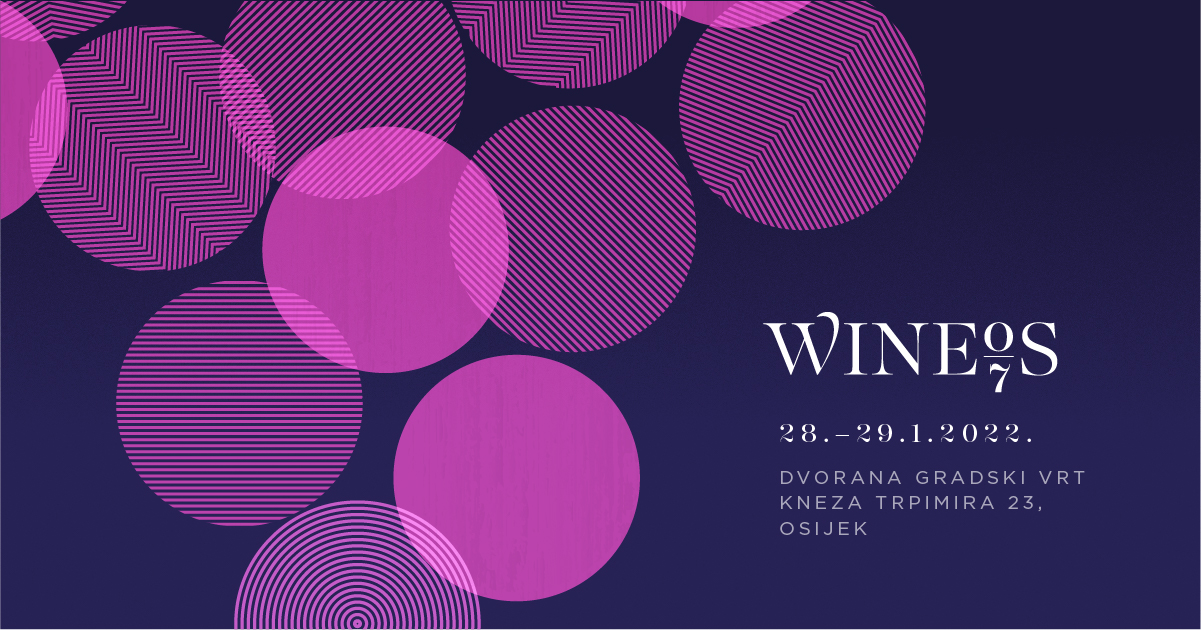
The seventh edition of WineOS will present and taste wines, hold seminars and educational workshops for business people, traders, sommeliers, caterers, journalists, and all wine lovers.
"At more than 1,900 square meters, we have 90 exhibition spaces and more than a hundred exhibitors. In addition, we will once again be able to watch a culinary show on stage where specialties will be prepared by four top local chefs, recognizable wine workshops will be held in a separate space, and the day before the fair, on January 27th, a gala dinner will be held at Waldinger Restaurant, which will be taken care of by our famous chef Goran Kočiš", said the president of the Decanter, Boris Ocić.
"There is great interest in wine workshops. Even before we officially announced the program, interested parties came forward and all the places were quickly filled. The lucky ones who managed to get a ticket will once again have the opportunity to taste numerous exclusives represented by famous winemakers from Croatia, Hungary, Austria, Serbia, and Bosnia and Herzegovina", said the head of the workshop program Željko Garmaz.
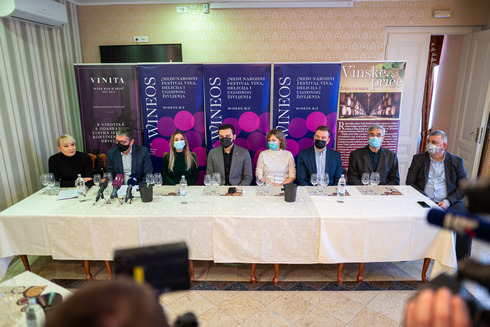
The association Graševina Croatica rejoined the organization as the largest and most important organization of wine producers in eastern Croatia. "WineOS is the central event for this wine region and is moving in the direction of transformation into the largest and most important fair in Croatia and the entire region. We will wholeheartedly help the organizers along the way. This year, as usual, we put the emphasis on Graševina as the broadest, most economically important, but also the most potent variety of this region'', Pavić added.
The organizers of the seventh edition of WineOS agreed on a greater engagement with the Osijek School of Catering and Tourism, which in this event recognized the opportunity for additional education of students and promotion of programs and projects. "Our students regularly go through internships in catering facilities, and this is an opportunity for them to learn how to work at big events. We have invested a lot in improving the program, additionally trained lecturers and mentors and now we want to apply it in the learning process", said the director of the School of Catering and Tourism Andrej Kristek.
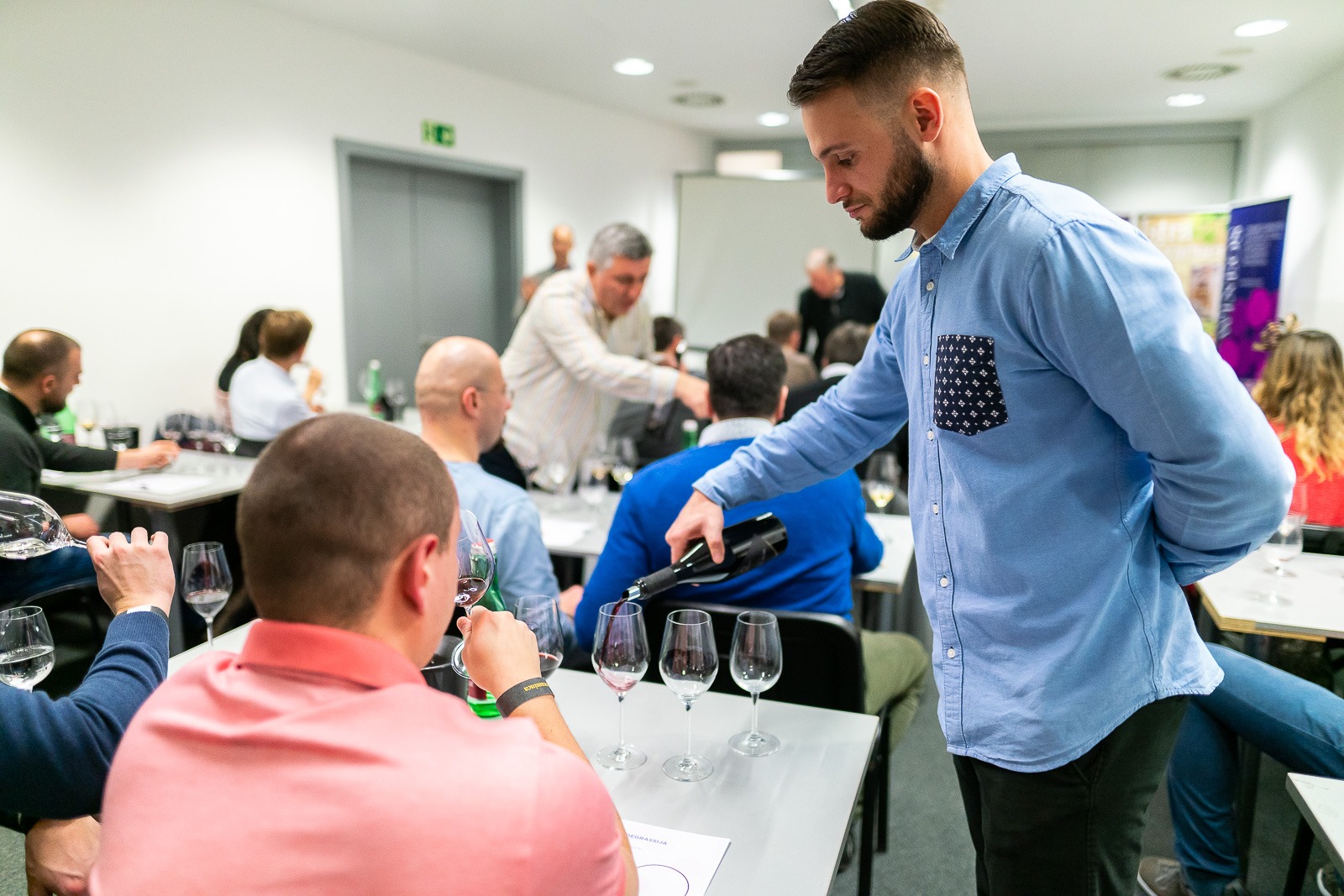
Photo: Denis Despot
"Wine events are attracting more and more guests to the continental regions, and the events we have in our county are becoming a recognizable lure for domestic guests and tourists", said the director of the Osijek-Baranja County Tourist Board, Ivana Jurić. She emphasizes that WineOS, as one of the largest events of this type, is already well known throughout Croatia and neighboring countries. Therefore, supporting this event, she says, is a logical and simple choice.
"It is not difficult to support such an event, which has grown seriously in recent years in every sense. More and more good and positive stories are coming out of Osijek, and WineOS is one of them. Despite the difficult times, the organizers made an effort to make our city a real wine center once again. Therefore, I wish them good luck with the message that the city administration is always ready to support quality projects", commented the Deputy Mayor of the City of Osijek, Dragan Vulin.
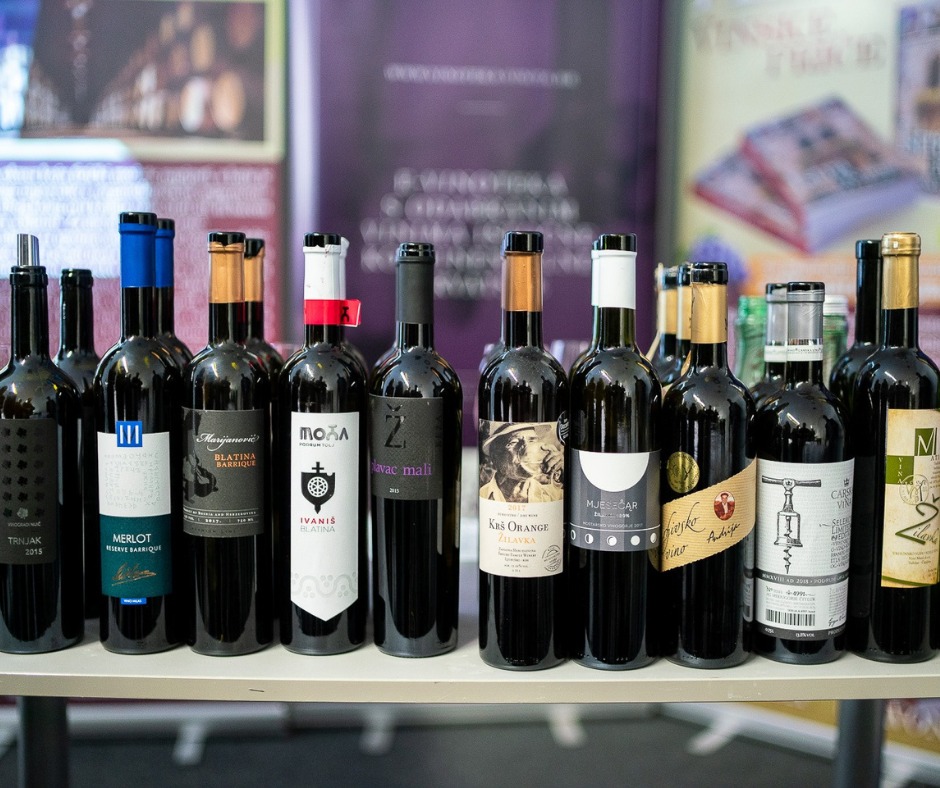
Photo: Denis Despot
The Head of the Administrative Department for Tourism, Culture, and Sports, Tatjana Roth, addressed the audience on behalf of Osijek-Baranja County. "Wine and gastro tourism attract many guests, and we do not lack offers. WineOS is extremely important in the promotion of this segment and we were certainly happy to get involved in this story as sponsors. I am sure that the fair will fulfill its purpose in these challenging times and bring a lot of work to wine and delicacies producers".
The seventh edition of WineOS will be held on both days from 3 to 9 p.m. It will only be able to enter the hall upon the presentation of a valid COVID certificate or negative test. Tickets will be sold exclusively at the hall entrance at a price of 100 kuna for one festival day. Visitors will also be able to rent a festival glass at the entrance.
Anyone who does not have a COVID certificate and wants to visit WineOS will be able to do by testing in the medical office of Dr. Špiranović, at 54 Stjepana Radića Street, at a preferential price of HRK 50. The clinic will be open from 8:00 am to 3:00 pm on January 28 and from 8:00 am to 12:00 pm on January 29.
It should also be noted that after the press conference, a wine workshop was held and led by the famous master sommelier Eric Zwiebel. On that occasion, those present were able to taste 13 Graševina from five vineyards in eastern Croatia, and the distinguished guests pointed out the good potential of the variety that stylistically fits into current market trends. Tonight, Zwiebel will hold another workshop to present Riesling wines from the French region of Alsace.
Here's the complete schedule for the seventh edition of WineOS:
- Thursday, January 27, 2022 - Gala dinner "SLAVONIA ON A PLATE AND IN A GLASS" by Goran Kočiš and Graševina Croatica
Time: 7:30 pm
Location: Hotel Waldinger
Entrance: 400 kuna
Menu:
Duck liver torchon / brioche / black walnut
Beetroot risotto / blue cheese
Catfish / holandaise / black pig
Rabbit ravioli / parsley
Deer / red cabbage / chestnut
Bags / plum / cream
- Friday, January 28, 2022 - Workshops
14:00 pm - Sauska - Hungarian wine giant with cover; entrance 100 kn
15:30 pm - Michael Gross - Austrian wine prodigy who brings glory to Slovenia with his wines; entrance 150 kn
17:00 pm - Josić Winery - Croatia Baranja fights back to Villany, and we have Cabernet Franc for the race; entrance 100 kn
18:00 pm - Luka Krajančić - Great vertical of Intrade, the most important white wine in Dalmatia; entrance 150 kn
Daily ticket for all workshops: 400 kn
- Saturday, January 29, 2022 - Workshops
14:00 pm - Vlado Krauthaker - The Wonderful World of Graševina, entrance 150 kn
15:30 pm - Grabovac Winery - Blue Lake Riserva, Dalmatian "Superzagorac", entrance 100 kn
17:00 pm - Božo Aleksandrović - Pedigree, the best wine in Serbia, entrance 100 kn
18:30 pm - Josip Brkić - Good Bye, Limousine!, entrance 150 kn
Daily ticket for all workshops 400 kn
Source: Osijek 031, Vinske Priče
Croatian wines and grapes are among the best in the world, and you can find more information about them in Total Croatia’s Guide to Croatian Wine HERE.
For more on lifestyle, follow TCN's dedicated page.
Sip Back and Relax: First International Plavac Mali Day Celebrated Today!
September 21, 2021 - Today marks the first official celebration of International Plavac Mali Day! To celebrate this special event, Croatian Premium Wine Imports, Inc. gathered top experts, sommeliers, winemakers, and connoisseurs for a fun online symposium on Croatia's "King of Red Wines". Sip back, relax and have a look into the wine-growing regions, wine industry, and wine tourism of Croatia. Also, don't forget to use the official hashtag #internationalplavacmaliday!
As TCN wrote a week ago, Croatia's gradual rise in the international gastronomy scene allowed more and more people to discover the exceptional quality of Croatian wines, and rightfully so. Thanks to their growing popularity, three international wine days dedicated to Croatian wines came to life this year alone: the International Pošip Day (May 21st), the International Croatian Wine Day (June 25th), and last but not the least, the International Plavac Mali Day (September 21st).
 Photo source: Kyla Ibero
Photo source: Kyla Ibero
TCN was invited to take part in an online symposium on the plavac mali variety, which was initiated by the people who are largely responsible for the undeniable progression of Croatian wines to the international market. The talk was hosted by Mirena Bagur, the Vice-president of Croatian Premium Wine Imports, Inc., and Anna Vidučić, the founder and president of Aroma Wine Co.. Together, they invited participants from all over the world including experts from the Croatian Chamber of Economy, Croatian sommeliers and winemakers, oenologists, wine connoisseurs, and importers.
The talk was conducted the day before the International Plavac Mali Day at 6pm CET and was attended by more than 30 experts in the wine industry. The guests who graced the event with their informative talks on the Croatian wine industry, Plavac mali grape production, and international promotion include:
- Leo Gracin, Doc. Dr. Sc. - Oenologist, Vino Dalmacije winemakers' association president, assistant professor of Meditteranean Agriculture at the University of Split
- Siniśa Lasan - three-time Croatian National Champion Sommelier, Decanter Judge and head sommelier for Rixos Dubrovnik Hotel
- Ivo Jeramaz of Grgich Hills, Napa & Grgić Vina, Pelješac
- Antonija Car-Antunović of Saints Hills Winery
- Marko Šuman of Terra Madre Winery
At the beginning of the symposium, Mirena and Anna delighted us with the story behind the Croatian Wine Alliance. Anna Viducic, a French-born Croatian wine buyer from Paris, found herself in the USA in 1998 after following her passion for the hotel and restaurant business. "I arrived in the US at the time when most people did not even know where Croatia was", she said. Later on, she started to work at a wine magazine. Anna recalled the time when no one wanted to write about Croatian wines but now, according to her, Croatia is a country that is known for its wine and its food culture. Fortunately, she met Mirena who shares her passion for Croatian culture. Eventually, the two decided to team up and promote Croatian wines in the USA and internationally - thus, the Croatian Wine Alliance was established.
Mirena Bagur also said that although Croatia has many wine varieties to offer, they are, at present, focused on promoting wines from the region of Dalmatia because Dalmatian wines such as Pošip and Plavac mali are the ones which are primarily consumed in the USA.
Meanwhile, Leo Gracin, the president of Vino Dalmacije pointed out that in recent years, associations in Croatia have been working hard to accomplish legal and administrative work to secure funding. "Many organizations didn't have funding until recently.", he said. The highly esteemed oenologist on Croatian wine earned his Master's and Ph.D. with a special focus on plavac mali and its polyphenol and aroma content. "When compared to other variety, you will see that plavac mali is really unique. It is the most tannic variety but if it's ripe, it's good. It has perfect acidity", he told the group.
Sommelier Siniša Lasan shares the same opinion on the unique "little blue" grape varieties and their current elevated status on the international market. He also commented that there are a lot of beautiful Croatian rosé wine selections that come from the plavac mali variety which consumers need to try out.
Ivo Jeramaz of Grgic-Vina shared the history of plavac mali which is very significant to their company because it featured his uncle, the legendary Napa Valley winemaker who founded Grgich Hills and also discovered and traced the close relationship between Zinfandel and Plavac Mali, the great Miljenko "Mike" Grgich. Their remarkable story can be read here.
Winemakers Antonija Car-Antunovic of the Saints Hills Winery and Marko Šuman of Terra Madre Winery both talked about wine production and wine-growing region of Pelješač, Istra, and Komarna. According to Marko, Komarna is the youngest wine-growing region in Croatia, and that the region produces the lightest kinds of wines. Meanwhile, the Dingać wine-growing region has always been known over the centuries as one of the best vineyards of Plavac mali variety.
Wine tourism and international promotion of Croatian wines
Nikolina Trojić and Vanja Kaludjer from the Croatian Chamber of Economy were also present in the meeting. They assured us that the HGK is devoted to promoting Croatian wines locally and internationally. On wine tourism, Nikolina commented that Croatia is a relatively small country compared to other established wine countries such as France and Italy and that the already limited production of Croatian wines is largely consumed "by the doorstep" mostly by tourists consumers. According to her, the highly regarded health benefits of the Meditteranean diet and the country's selection of delectable wine varieties are a huge plus for Croatia's tourism sector. She also noted that 47% of Croatian wine production comes from Plavac mali.
The symposium ended with Q&A as leading experts in the wine industry and connoisseurs from all over the world participated. One gentleman from Switzerland asked if Croatia will resume its international Croatian wine campaigns which were previously conducted in Zurich and Geneva a few years back and expressed that he thinks that this is a very important thing for Croatia to do in order to be recognized as a wine country. Vanja Kaludjer, from the Croatian Chamber of Economy, answered that Croatian wine promotions are conducted all over Europe including the USA, Canada, and even China. However, it is basically up to the council of wine associations to decide which country the promotion would take place in and that HGK is not in the position to decide on this matter. He also added that due to COVID-19 and earthquake damages suffered last year and this year, the funding was transferred to crisis measures and housing measures; but rest assured, the Croatian Chamber of Economy is doing its best to resume the international promotion of Croatian wines.
Sam Ramic, the Director of Sales at Wine Worldwide, Inc., commented that if he were to compare the Italian wine industry which conducts hundreds of promotional activities versus Croatia's significantly less number of events per year, Croatia's promotional efforts seem like baby steps. He then proceeded with a very important question: What is the next step to take Croatian wines up a notch? "Now everybody knows Croatia and so I think, we need to push it", he remarked.
Vanja Kaludjer answered, "It's all about the budget for us. We have done many administrative and legislative works in the construction of regional association development and we have resolved a lot of issues with basic financing and legal establishment for the past few years. There are also ongoing projects to promote Croatian wines to foreign markets and also many individual efforts of local wineries, winemakers, and importers are being done."
Leo Gracin also emphasised that the promotion and production of Croatian wines were held back due to the previous problems in organising the associations which have now been fixed. He retaliated, "Now, it is ready for promotion. With better marketing, we can make better results twice. With the newly secured funds, we can get better-protected marks on the bottles. Upon saying that, we have more jobs to do for stronger marketing and obtaining protected trademarks. It will come, I promise you."
Mirena added that associations are finally legally established and can now receive proper funding from the European Union and Croatia. "There is still more work to be done. For starters, importers like us are promoting Croatian wines by selling in other countries.", she said. Mirena also hopes that through the alliance and its member associations, words about Croatian wines will spread fast.
The Q&A portion of the event ended up as a productive open forum on different promotional strategies and limitless possibilities of Croatian wines.
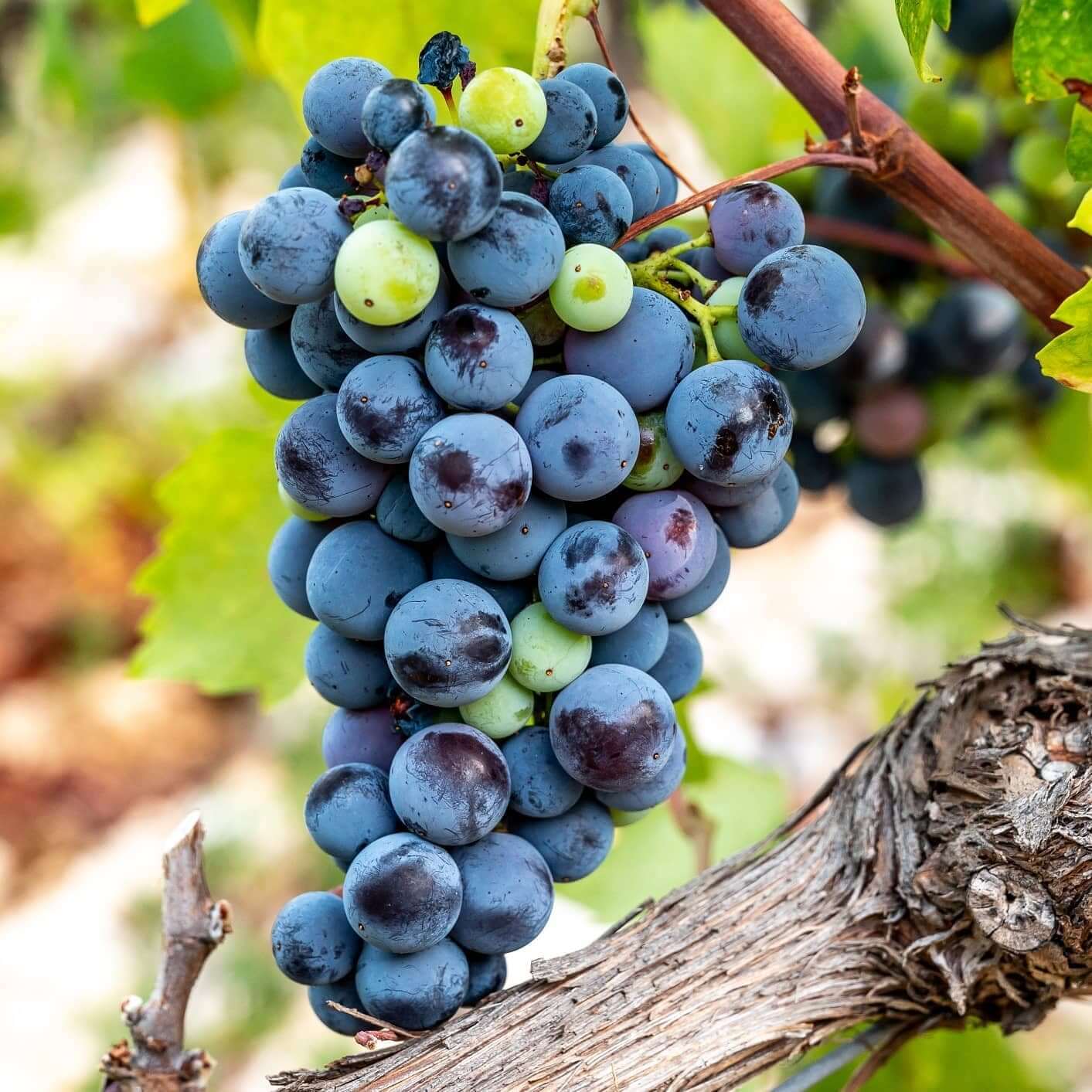 Photo source: International Plavacmali Day Official Facebook Page
Photo source: International Plavacmali Day Official Facebook Page
How to Celebrate International Plavac Mali Day?
- Follow Plavac Mali’s adventures on https://www.facebook.com/internationalplavacmaliday
- Tag that page when you post your own content and use hashtag #plavacmali and #internationalplavacmaliday
- Create your own tastings, wine pairings, giveaways, or educational events – in person or virtually, and tag the social media handles
- Write articles about #plavacmali
- Invite the media to the virtual event on September 20, at noon Eastern time to present Plavac mali and the wine industry in the region. Media can register for the Zoom link, here: http://eepurl.com/hGY1xf
- Encourage others to participate in celebrations.
For more on Made in Croatia, follow TCN's dedicated page.
For more on lifestyle, CLICK HERE.
Find out more on the latest Croatian news.
Plešivica Sparkling Wines Served With Breakfast at Special Event
June 6, 2021 - Guests enjoyed a pleasant encounter with the best selection of Plešivica sparkling wines and breakfast snacks, in the hills outside Zagreb.
A sparkling breakfast in the Chez Suzy vineyard for the weekend was the real formula for outdoor hedonism, reports Turističke Priče. At Plešivica, Šember wineries, Šoškić court wines, Drago Damir Režek, and a guest from the Krašić vineyards, Šimanović winery, presented their sparkling wines for which this wine region is famous. In addition to Plešivica sparkling wines, guests enjoyed strawberries and indigenous products of Zagreb County and copanjek, and homemade game salami. As an announcement of the upcoming Sparkling Zagorje breakfast in Zagorje, štruklji, zlevanka, cheeses, chocolate mousses, and chocolate cake were also served.
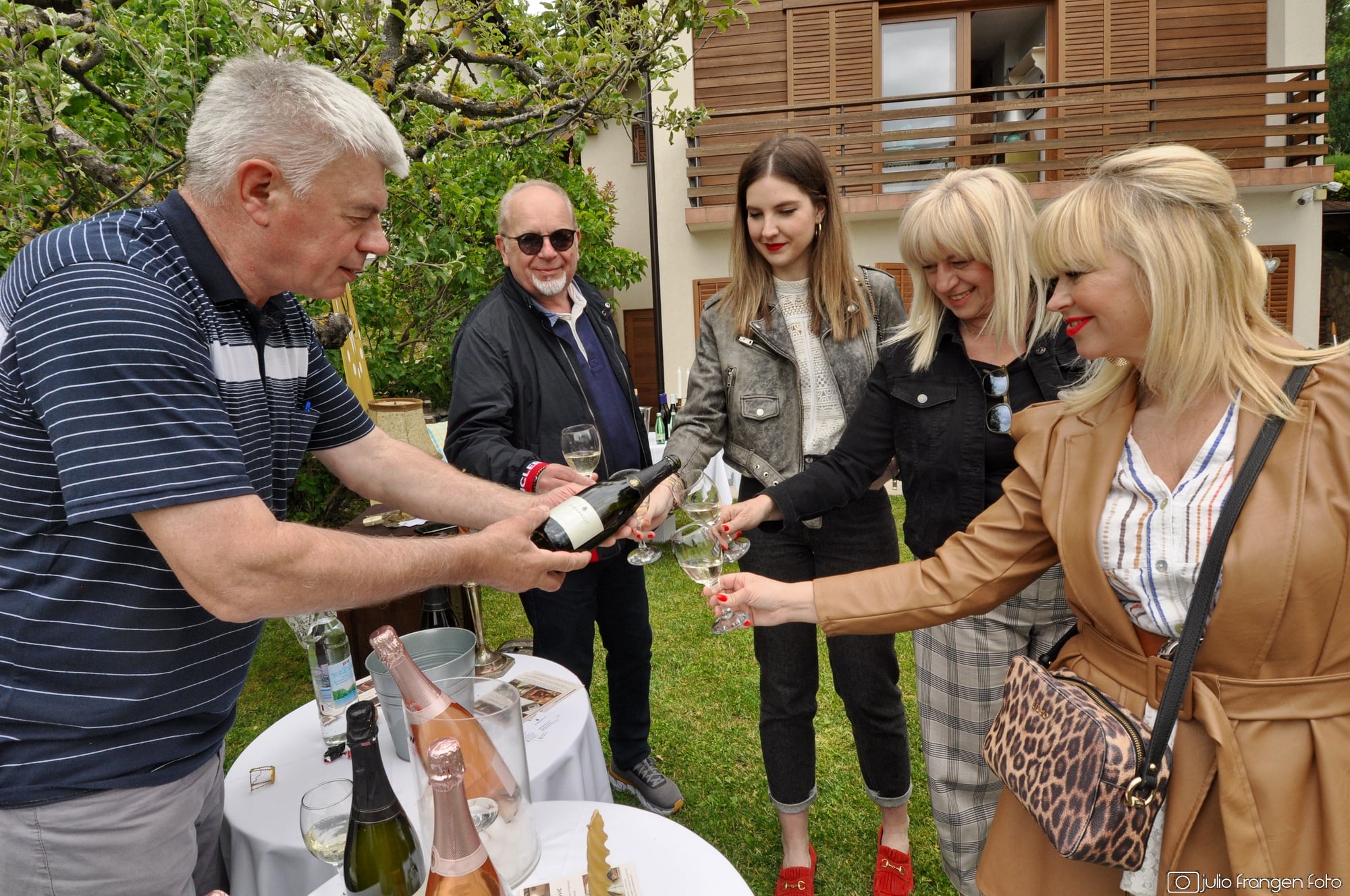
Salon of Sparkling Wines
The novelty of this year's Sparkling Breakfast edition was the guided pairing of food and Plešivica sparkling wines. The event was driven by the idea of the hostess Suzana Košćak, gastronomy students Izabela Andrašić, Adrian Karačić, Filip Poštenik, Bruno, Karić cooked at the event. The menus were paired with champagnes, after a hearty breakfast dominated by cheeses and strawberries, continued with freshly baked homemade focaccia and steak tartare that future chefs prepared next to the guests. It was a real "cooking show", and then from a small three delicious risottos came out in hot kitchens full of original ideas, the first with apple and celery, the second with asparagus, the third with strawberries. An additional joy of pairing was homemade macarons with champagne. Demanding but purposefully selected, the yellow lemon cream cookies were paired with white brut champagnes, and the pink champagnes matched the pink strawberry sour cream cookies. Macarons were made by a gastronomy student, Ana Tokić.
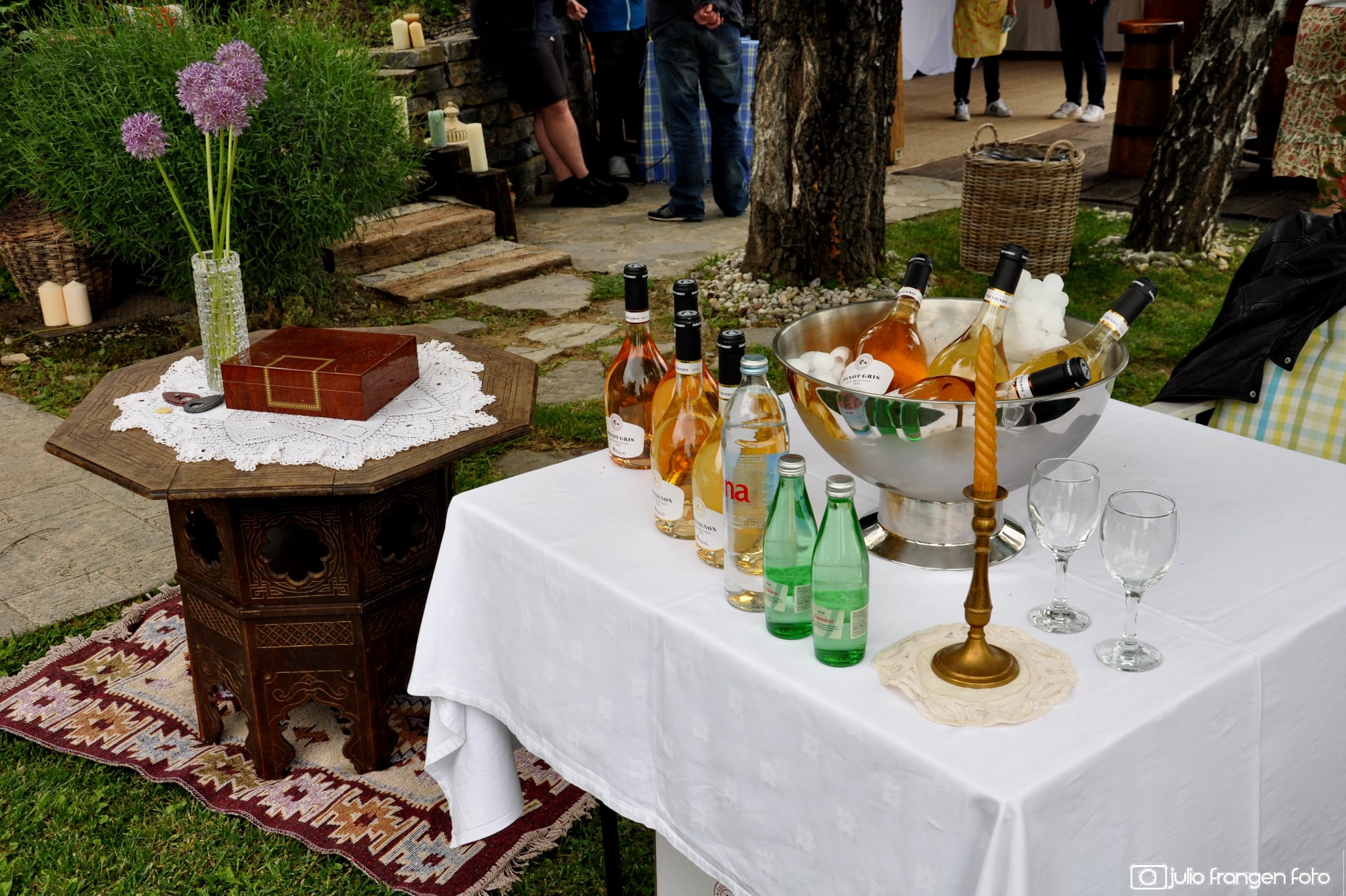
Salon of Sparkling Wines
The eye pleased, the palate celebrated, and the wines matched. The snacks were mesmerizing and the guests truly enjoyed themselves. An additional interesting and refined gathering was the presentation of a new wine from each winery, the so-called "An example of Plešivica". In this part of the program, Šember winery presented its new Chardonnay 2020, Šoškić wines, Sauvignon blanc 2020, Drago Damir Režek wines - Pinot Noir 2017, Šimanović wines presented Frankovka 2017. A special surprise of the day was Šoškić brandy, many did not know that such a pearl exists on Plešivica, it was sipped with gusto, gentlemen "spiced" it with cigars, and ladies with cigarillos. As an additional spice to the wonderful country atmosphere, similar to Provencal, served antique props from the Comedy Theater as well as tables and accessories from DVD Plešivica.
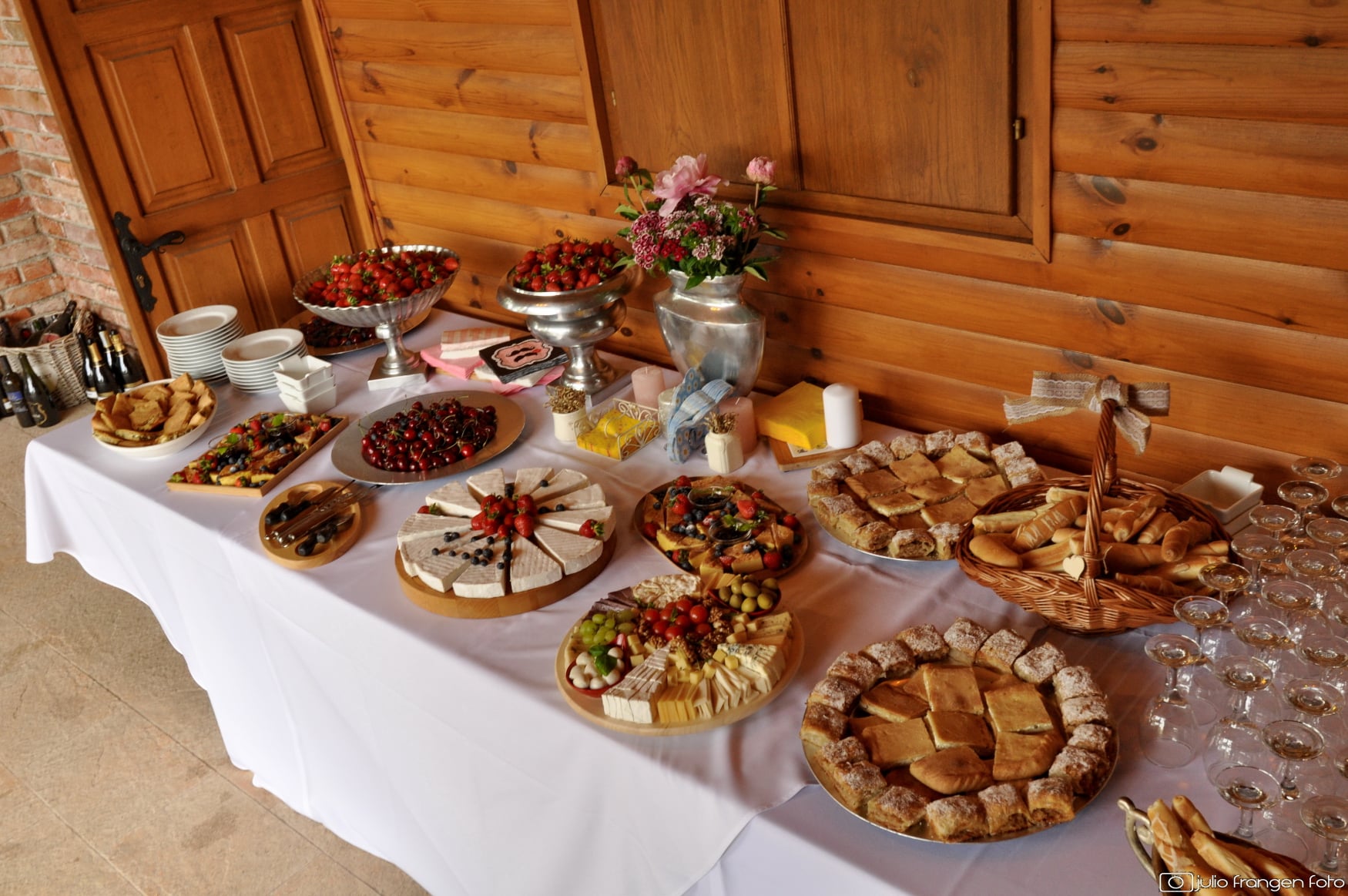
Salon of Sparkling Wines
Delighted guests, sparkling wine lovers, but also wine connoisseurs, sommelier, oenologists, wine merchants, in pleasant conversations with winemakers learned about Plešivica wines and selected snacks and the potential of various forms of tourist offer Plešivica in the context of branding wine destinations and entire vineyards through targeted, smaller events.
Croatian wines and grapes are among the best in the world, and you can find more information about them in Total Croatia’s Guide to Croatian Wine HERE. Total Croatia’s articles are now available in your language!
For all you need to know about Zagreb in 2021, make sure to bookmark Zagreb in a Page.
For more on lifestyle in Croatia, follow TCN's dedicated page.
12th World of Malvasia: International Evaluation for Vinistra
April 24, 2021 - The best overture for Vinistra is the international evaluation of the World of Malvasia, which took place for the 12th time, in the Parentium Plava Laguna hotel in Poreč, which from year to year breaks records in terms of quality and number of samples. Thus, 435 samples of wine and spirits arrived for this year's evaluation, of which 220 samples were Malvasia.
As hrturizam.hr reports, a new name on the wine scene, Denis Bernobić from Markovac near Višnjan, won the championship title in the category of fresh Malvasia. Competing with three other top Malvasias, his wine took the win. This is also the biggest surprise at evaluating wine and spirits and the 12th World of Malvasia, which was traditionally held in mid-April at the Parentium Plava Laguna Hotel in Poreč.
"The lineage has always been the foundation of the existence of us Istrians. My family has been in winemaking for four generations, but the focus has been on top-quality wines for the last few years. The championship title is a great success, I must admit a surprise, but also recognition and encouragement to continue in the same direction", said Denis Bernobić.
Malvasia Collina from the 2016 winery Cattunar from Nova Vas near Brtonigla is the champion in the category of mature Malvasia; Teran Barbarossa, Vina Tomaz from Motovun, won the championship title in the fresh Teran category; while in the mature category, that title went to the wine of Santa Lucia from 2018. Kozlović Winery from Momjan.
In the category of mature refoška, the champion is Capo d’Istria from 2013, Slovenian Vinakoper, and five big gold medals were awarded to wines that won more than 92 points. These are the 2015 San Salvatore Muscat White Benvenuti wines from Caldir; Muscat yellow from 2019. Capo wine from Fernetić; Malvasia volcanica from 1956 by Spanish manufacturer El Grifo Canari; Merlot from 2017 Siljan wines from Krnica, and Aura biska extra from 2021 from the Buzet distillery Aura also won big gold.
"We are extremely pleased that we have managed to organize such a demanding competition in these unusual times. I am pleased with the top quality of the champion wines and the fact that as many as five wines crossed the threshold of 92 points and won great gold", said Nikola Benvenuti in front of Vinistra.
Another 139 gold and 16 silver medals were awarded, while other manufacturers received diplomas. This year, the right to the IQ label - Istrian quality was exercised by 24 winemakers for Malvasia and seven winemakers for Teran.
The IQ - Istrian quality label is primarily intended to label high-quality wines produced from Istrian and Teran Malvasia grapes and encourage the development of production of these indigenous wines, raising the level of their quality production technologies and promotion and sales on the domestic and world markets. The IQ mark enables the consumer to recognize those Istrian wines whose quality is higher than the quality prescribed by the law for quality wines with the geographical origin and higher than what the customer usually requires and expects.
This is a unique, active wine control system in Croatia where winemakers themselves gradually raise the scoring threshold for wines bearing the IQ - Istrian Quality label to standardize and increase product quality. The IQ label guarantees an active quality control system that takes place on four levels: in the vineyard (yield control), in the cellar (vinification control), chemical analysis, and organoleptic evaluation, and after the label is awarded, market control is performed.
This is precisely how the quality of the wine region is strategically raised and branded. It is important to emphasize that the Association of Winemakers and Winegrowers of Istria was founded in 1994. Therefore, it is a continuous process and strategic goal of raising Istrian wines and branding Istria as a wine region.
Great results and championship titles are the best announcement of the 27th Vinistra, which is being held in the open air for the first time this year, in the Peškera bay in Poreč. Although it was initially announced that the 27th in a row Vinistra will be held from 7 to 9 May in Poreč, due to the epidemiological situation throughout Croatia, the organizers announced that they are changing the date and place of the event.
The exact date is not yet known. For now, the focus is on June. The organizers of Vinistra are optimistic and do not give up on organizing this year's Vinistra.
To find out more about Croatian Wine, click HERE.
Vinart Grand Tasting: Biggest Wine Event in Croatia to be Held in Spring 2021
January 29, 2021 – Winemakers are delighted as it's announced that the Vinart Grand Tasting, the most important business wine event, will take place in the spring of 2021.
As Turizam24 reports, the Vinart Grand Tasting will be held on April 30 and May 1, 2021, in Zagreb's Lauba. The organizer, the company Vinart, moved the fair's date from the beginning of March to the beginning of May due to the uncertainty of the epidemiological situation and the duration of anti-epidemic measures.
As a reminder, last year's Vinart Grand Tasting was the last professional wine fair in Europe. It was held on March 6 and 7, 2020, just before the first lockdown, while many details about the COVID-19 virus were unknown.
"It was uncertain until the last second, and in the weeks before the fair itself, we practically didn't sleep because of worries. We prepared the program, and after the fair, we organized a study trip to Croatian wine regions for a group of about twenty important European and American journalists. We invested a considerable amount of money, hoping that we would make a big step to recognize Croatian wines and winemakers globally, and everything was so risky and uncertain. In the end, only three journalists canceled our trip, and others came and were delighted with the offer and quality of Croatian wines. We did everything in our power to eliminate the risk of transmitting the virus," says Saša Špiranec, director of Vinart.
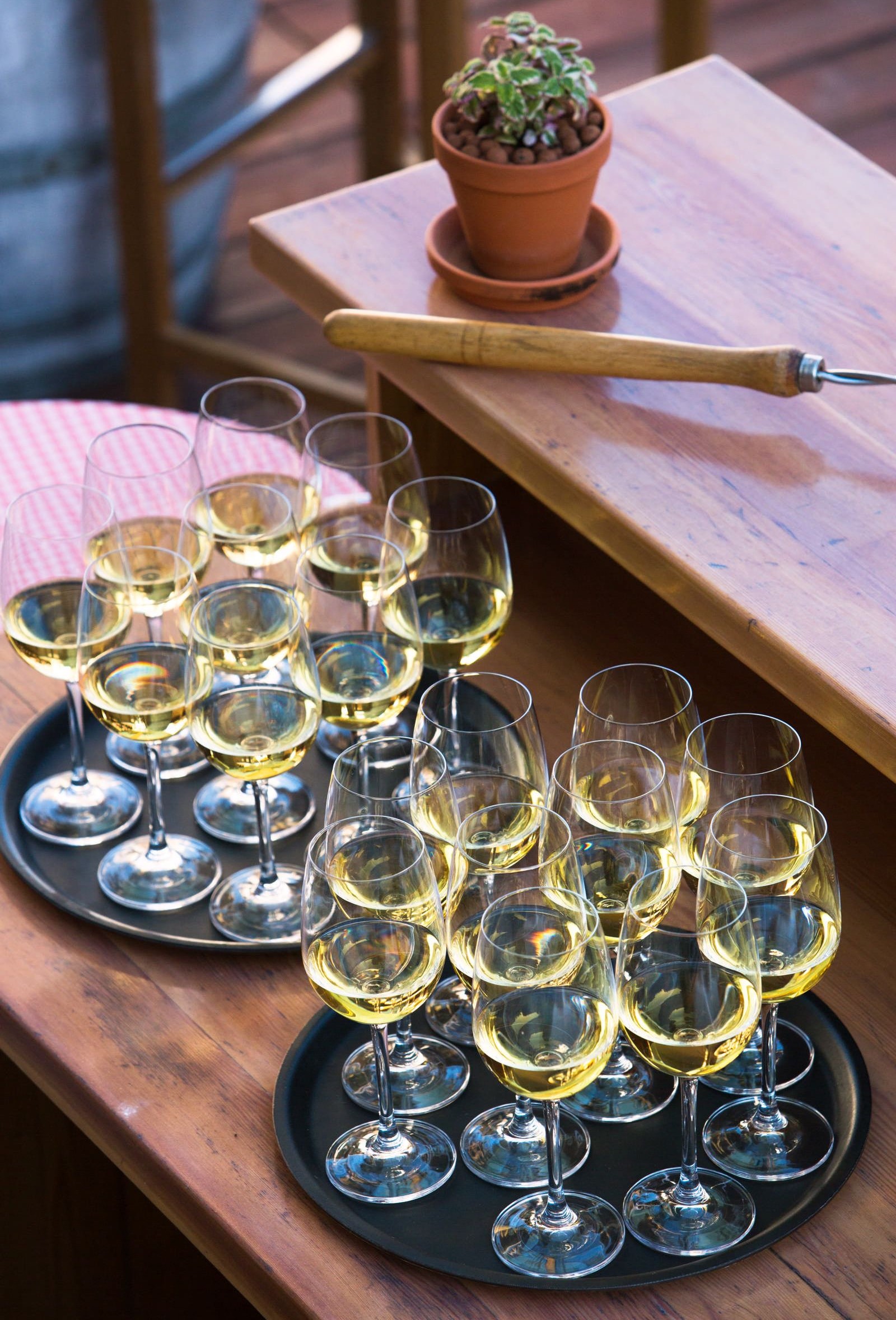
Wine tasting / Copyright Romulić and Stojčić
At last year's fair, there was no information that anyone had become infected. From that experience, they are ready to boldly enter into the preparation of this year's edition of the fair.
If the economy doesn't restart in May, we can say goodbye to winemaking
On this occasion, Špiranec answered questions about the situation in winemaking after the pandemic 2020. As expected, the autumn wave caused the most significant damage to this branch of the economy, extremely important for the tourism sector.
"Judging by the comments we received from winemakers, last year's drop in turnover was more than obvious. Different wineries have different experiences, but the average should be between 20 and 30 percent drop overall. The year's start was a shock, and sales stalled, but a good spring and early summer made up for that decline. The second, autumn wave did more damage that was only partially offset by sales in December when many winemakers had good results in direct sales due to gifts and increased household consumption. If such problems remained in 2021, they would surely become insurmountable for many wineries. If the situation after the Easter moves towards full normalization, then most wineries will recover," said Špiranec, who explained the chosen date in the still uncertain first part of 2021.
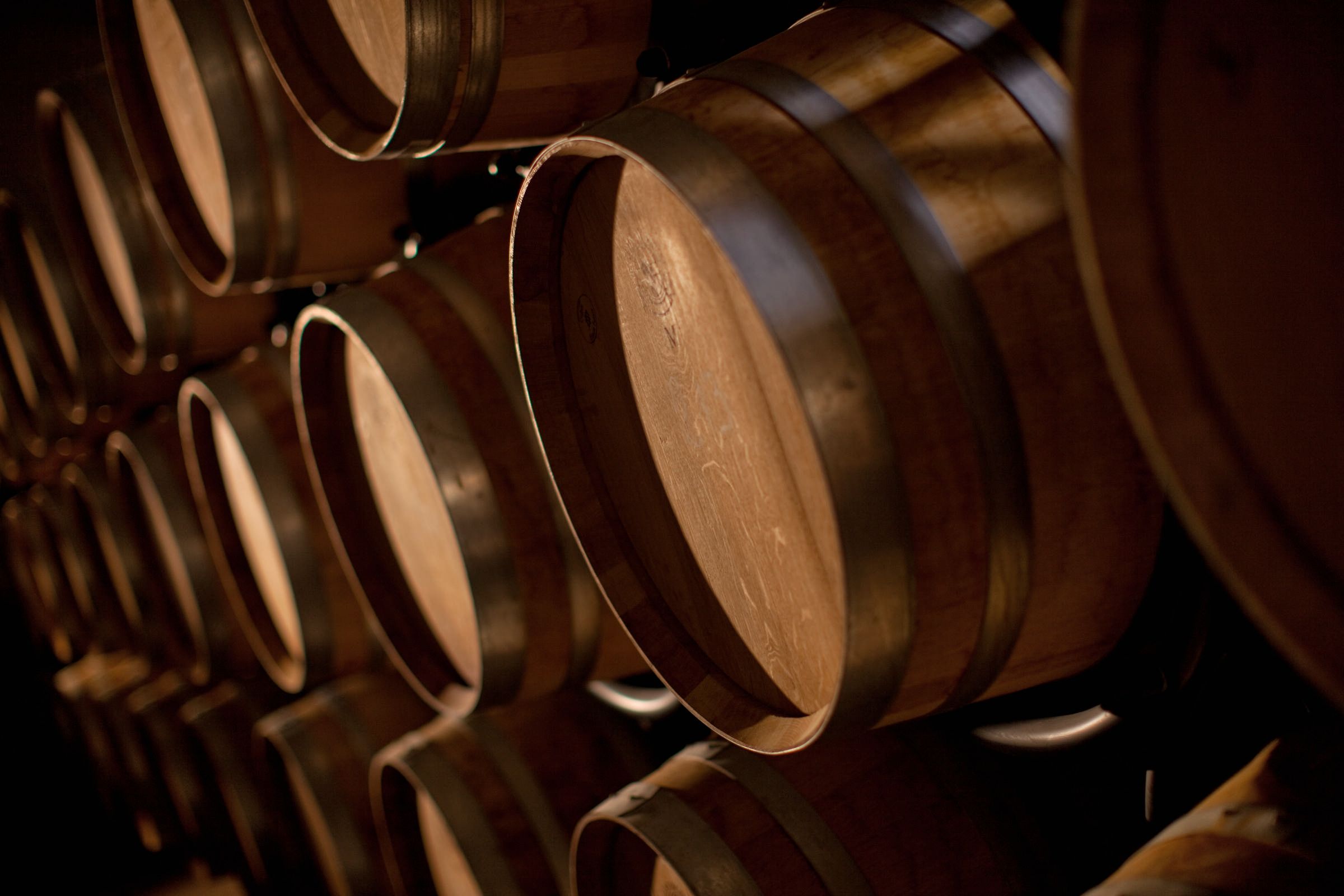
Copyright Romulić and Stojčić
"We have chosen dates when spring will already be in full swing. The days are long and sunny, and we believe that in the meantime, the measures and vaccination will significantly reduce the risks. We think May is the last moment for normalization, regardless of the circumstances with COVID-19, and that is why we chose the first days of May for the fair. If the economy does not start working normally in May, we can say goodbye to winemaking as its branch," concluded Špiranec, the leading Croatian expert in winemaking.
This announcement speaks best about the consequences of a pandemic. They hope that the situation will normalize after Easter. In that case, we can still expect the recovery of most stakeholders on the wine scene.
2021 is crucial for winemaking
Winemakers and wine business people are delighted by the announcement of the Vinart Grand Tasting.
"The capacity, which is further limited this year, is almost full after the first week of opening the applications. Winemakers and their customers send us numerous messages that they cannot wait for the fair and the start of activities and wine events. Now, things that they used to complain about, like too many fairs and trips, seem to them to be a blessing compared to this past year of passively waiting and staring into space," announces Špiranec.
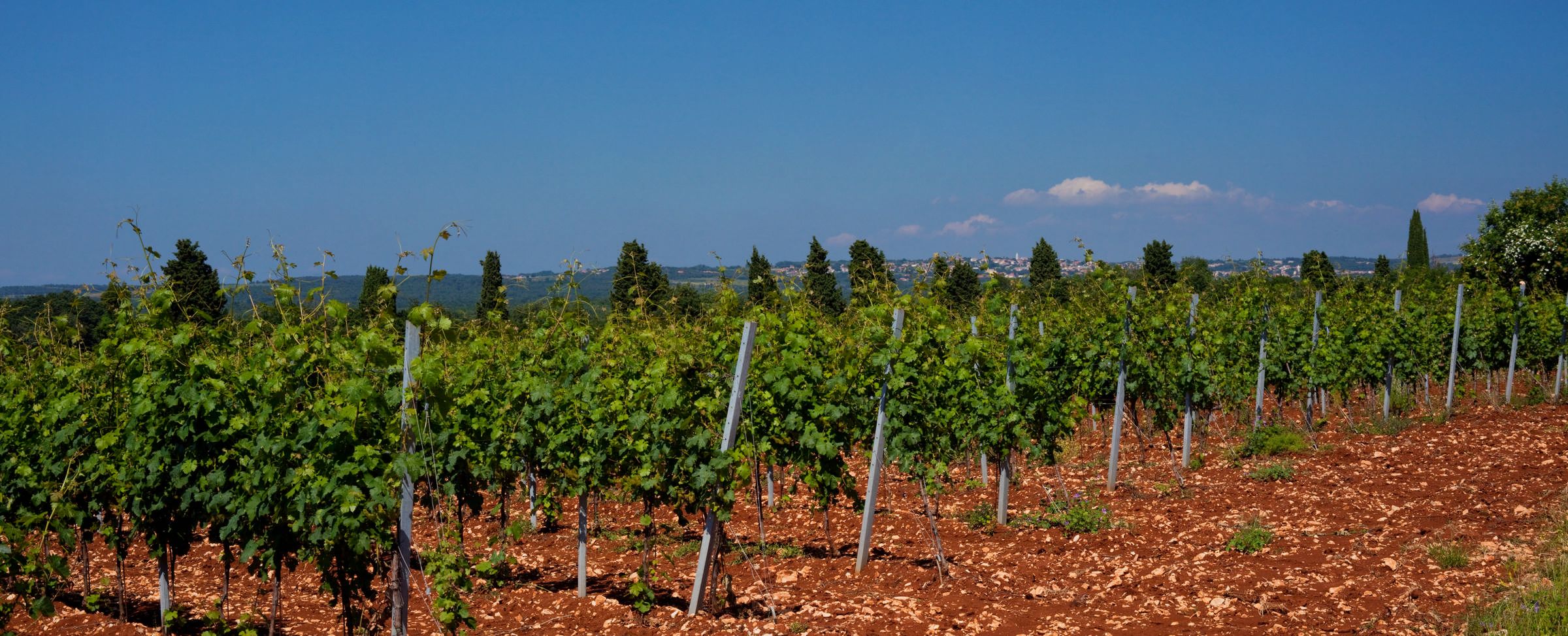
Vineyard in Istria / Copyright Romulić and Stojčić
It is evident that this year is crucial for winemaking. Without the opening and launch of the economy in the spring, there will be no winemaking. It remains to be seen how the situation will develop by May, but any such announcement and event that gives hope that the recovery will begin soon is optimistic. For winemakers, as well as for caterers, it is necessary to start economic activities no later than Easter. Otherwise, we will have a total collapse.
To read more about lifestyle in Croatia, follow TCN's dedicated page.
In Cultura Veritas: Successful International Cooperation of 40 Winemakers
December 6, 2020 – With the project In Cultura Veritas, 200 kilometers of wine roads and 80 cultural heritage sites were connected in the cross-border area between Zagreb County in Croatia and the Obsotelje and Kozjansko subregions in Slovenia.
As Lokalni.hr reports, the main goal of this recently completed project, which lasted 28 months and is worth one million euros, was to contribute to the attractiveness, attendance, and protection of the cultural heritage of the area and increase economic activity through the development of a new sustainable cross-border destination. The goals were also to strengthen the capacity of local stakeholders and the comprehensive promotion of tourist destinations from the Zagreb County and the Slovenian subregions Obsotelje and Kozjansko.
The In Cultura Veritas project was implemented by Zagreb County, with partners the Museum Documentation Center and the Association of Croatian Travel Agencies. Slovenian partners were the Sotla Development Agency, the Municipality of Šmarje pri Jelšah, and the Maribor Agricultural and Forestry Institute.
On behalf of Zagreb County, the project was presented by Ivana Rendulić Jelušić, who pointed out that thanks to this project, the attractiveness of the offer of cultural and wine tourism in Zagreb County was increased following the requirements of modern visitors.
The cooperation of about 40 winemakers from the area of Zelinska, Samoborska, and Plešivička wine roads, the towns of Samobor, Jastrebarsko, and Sveti Ivan Zelina, and their city museums have borne fruit.
As Večernji.hr reports, the attractions of wine and cultural tourism within the new destination have been promoted by the application of modern digital tools, the improvement of the visitor infrastructure, and the renewal of cultural heritage.
This project idea was developed thanks to the recognition of common and insufficiently promoted tourism potentials in the cross-border project area. The area has a rich and somewhat forgotten cultural and historical heritage preserved in about 80 cultural heritage sites located along 200 km of wine roads.
The centuries-old tradition of wine production is an important part of life in this area, and the quality of the wine is confirmed by numerous awards that adorn the walls of wineries on Plešivica, Zelina, Samobor (Croatia), and Šmarje-Virštanj wine roads (Slovenia). It is in this area that the oldest vine in the world is located, the one from Maribor. Also, the fluttering and fresh white wine Kraljevina, which is believed to have been drunk by the famous Beethoven, is an autochthonous variety produced only in the Zelina area in Croatia.
Zagreb County was the leading partner of this project and thus digitized the tourist offer of the new cross-border tourist destination. A digital catalog with the cultural and wine offer of this area is available on the project website, where you can find information about winemakers, museums, natural heritage sites, photographs, multimedia content, and interesting facts and legends about famous people associated with the project area.
The digital catalog is also available on a mobile application, as well as on tourist machines and smart benches set up by the Zagreb County in the center of the cities involved in the project – Sveti Ivan Zelina, Jastrebarsko, and Samobor.
To read more about lifestyle in Croatia, follow TCN's dedicated page.
Škrletovo, Festival Promoting Škrlet Wine, to be Held in Ivanić-Grad
One of the biggest events (and parties!) of the year, Škrletovo Party will be held in Ivanić-Grad again this year, starting on Saturday, April 13th 2019 at 4 pm.
The event is organized by the town of Ivanić-Grad, their Tourist Board and the Škrlet Moslavina Association. The main goal of the event is the promotion of the indigenous white wine variety Škrlet as the symbol of Moslavina region, where Ivanić-Grad is located. The event has traditionally had two separate parts: first a gathering of experts, winemakers, journalists, sommeliers etc. is held, where they discuss Škrlet and its position on the wine market. After that, in the afternoon, on the square in the centre of Ivanić-Grad, the party will be held.
8 winemakers from Moslavina are joined in the Association, and they're the ones working most hard on the promotion of the variety: Florijanović, Ilovčak, Jaram, Kezele, Miklaužić, Mikša, Trdenić and Voštinić-Klasnić. They understand that in order to position Škrlet on the market they need to act patiently, pro-actively and patiently, working hard on promotion but also on increasing the quality of wines each year, thus building the trust in their product on the wine market in Croatia.
Their wines will be offered to the public at the Škrletovo party, where you will be able to taste all of their wines with the purchase of entry fee for 80 kunas. The good atmosphere and the music will be in the hands of the local DJ Pepi Jogarde, another young local star, chef Dino Pavanić will be in charge of creating interesting finger food for the guests, and even a playground for the kids will be organized - to give parents some freedom to enjoy a glass of Škrlet.
In order to attract as many guests as possible, all train tickets to and from Ivanić-Grad on Saturday will be sold at a 40% discount.
Croatian Family Wine Businesses Even Attracting Americans
Plešivica is an oasis for lovers of traditional gastronomy and wine-making, a longtime favourite destination for many of Zagreb's residents, Plešivica is famous for its many vineyards, wineries, sparkling wines and traditional food. Several Croatian family wine stories are attracting attention even from across the Atlantic.
As Marta Duic/Poslovni Dnevnik writes on the 18th of January, 2019, the Šember Winery, located in the village of Donji Pavlovčani, is famous for its sparkling wines that have been produced in their vinery for years. Ivanka Šember, the wife of a winery owner who helps him run the family business, says their sparkling wines are produced from old varieties which grow only on Plešivica. They have an old vineyard with fifteen different old and almost forgotten varieties, to which winemaker Zdenko Šember gives his special attention. He inherited this vineyard from his late grandmother and has since turned it into a flourishing business.
This year, this Croatian family winery business also produced a variety of new wine sparkling wines, a white sparkling wine from a black pinot, a sparkling wine of the old varieties which were kept in clay pots originating from Georgia. The production of amphora wines deeply buried in the ground is an extremely old tradition over in Georgia, and today many Croatian winemakers use this method. This method of wine production makes each wine, including sparkling wine from the assortment of this winery, completely different in flavour when compared to others.
"My husband loves experiments, and some of them also get to see the market!" said Ivanka Šember. The Šember Winery is one of the few in the Republic of Croatia which manually produces its sparkling wines, each step done with their own hands and without any machines. As the Croatian family say themselves, everything has been made even easier since they obtained a new 320m cellar. In the construction of the cellar, which was co-funded through the National Wine Sector Support Program, this wine oriented Croatian family invested more than two million kuna, and their plans for this year are to further expand their vineyards by another three hectares.
"When it comes to our sparkling wines, our best sellers are rose, this year we have doubled our production, and we're currently producing 40,000 bottles. We're the first winery to have been producing sparkling wines from old Plešivica varieties, explained Ivanka Šember.
Located in the village of Lokošin Dol, the Braje Winery is known for its homemade food served with homemade wine. Robert Braje is the winemaker in this Croatian family, and his wife, Sandra, is an expert in local gastronomy and has been the chef in their restaurant for the last eight years. In this Croatian family business, their son shows interest in wine production, and Robert says that if this continues, he will soon expand his vineyards, which today already stretch to 3.5 hectares.
They purchase only a very small amount of their grapes, and from varieties that have a special emphasis on Red Waltz, an Austrian variety which is only offered by very, very few here in Croatia. As is the case with many Croatian wineries, the Braje Winery also serves numerous homemade dishes which pair well with the selection of wines that they produce and offer to their guests.
"From the very beginning, we've been doing everything business-wise as a real family. We produce 15,000 to 18,000,000 litres of wine, and a third of all that is sold right here at our very door. We also prepare meals from either our own or other locally grown vegetables, we make our own apple and pear juices. We have ducks, chickens, pigs, and a cow,'' explained Braje.
Their goal is to locally produce food and wine for their guests, in order to get them to notice and appreciate the distinct differences. "I cook and prepare everything, which is almost all made from local ingredients, we have a cow so that we can have our fresh cheese, cream and milk, eggs from our chickens, sausage and bacon from our pigs, and if we don't have enough of our own vegetables, we buy it from other producers in the neighbourhood. I make homemade bread, pasta, noodles... Our guests come either individually or in small groups, and we have many guests from the USA,'' noted Sandra Braje.
Režek Winery is yet another traditional Croatian family business that Damir Režek inherited from his father, Drago. "Our story began with my great-grandfather Roko, who had 40,000 vines, and the most famous type he had was a Portuguese variety. That Portuguese variety is the very story of my family and I'm glad that this slightly forgotten variety has now been revived, and my grandfather later brought new varieties, such as sauvignon, and was one of the largest producers in this region,'' stated Damir Režek.
The last vineyard was planted back in 2005, so now they have four hectares and about 20,000 vineyards.
Vinarija Kolarić in Hrastje Plešivičko is known for its rich homemade food, wines, and sparkling wines. Franjo Kolarić has a restaurant and since 2009 a mini hotel with sixteen rooms in which he has invested more than three million kuna. As he says, he's typically full from May to October. A warehouse for sparkling wine was built back in 1997 and Franjo is currently working on a new line of sparkling wines, in which he planning to invest 1.5 million kuna.
Thanks to the extension of the restaurant there is now seating for more than 170 people, and in addition to the sixteen rooms currently available, he plans to build an apartment this spring. In addition to all of the above, one of his plans is to build a small brewery and produce small quantities of craft beer.
Make sure to stay up to date by following our dedicated lifestyle page. If it's just wine you're interested in, give Total Croatia Wine a follow.
Click here for the original article by Marta Duic for Poslovni Dnevnik
Could Slavonia be Transformed into Croatian Tuscany?
Could Slavonia become Croatia's very own Tuscany through the story of its local wine? Possibly, as Kutjevo has seen a massive 54 million kuna investment into its new area.
As Poslovni Dnevnik writes on the 11th of November, 2018, on Friday in Kutjevo in Slavonia, a new investment in the Galić winery worth a massive 54 million kuna was presented, the huge investment will increase the winery's capacity by as much as one-third, as they announced.
Of the 54 million kuna, 35 million kuna was invested in the building itself and another 19 million kuna into the equipment. Winery owner Josip Galić pointed out that the winery will remain a boutique winery, and will follow all the current trends, continuing to produce quality wines, rather than focus on mass production.
"Although our winery could be considered a miracle of modern technology and has equipment that even the world-renowned wineries would envy, we're just starting to build our story in Kutjevo. The ultimate goal is to develop the whole region, we want to make a Croatian Tuscany out of Slavonia, as it justifiably deserves it,'' explained Josip Galić, the owner of the winery. The CEO of Galić wine, Andrej Markulin, pointed out that this year, the winery is celebrating ten years of business and wants to intensify its production of "serious" wines in the long run.
The winery in Slavonia looks simply like brick and concrete, but attracts tourists and wine lovers from all over the world, and the attraction is intensified just by viewing the interior and getting to know the equipment that the world's best manufacturers are currently offering.
"With new technology and equipment, we have all the conditions [available to us] to achieve this goal very quickly," he pointed out. The winery began with seven hectares of vineyards and 30,000 bottles of wine. Today, there are 55 hectares, and some of the grapes are from local wine growers.
The capacity of the new winery is 630,000 bottles, which is 30 percent more than there is at the minute, and their annual production is 330,000 litres. In addition to wine production and grape growing, Galić launched chestnut and blueberry growing this year, into which there will be an additional investment of 8.5 million kuna.
Want to keep up with more news like this from Slavonia and from across the country? Make sure to follow our lifestyle and Made in Croatia pages for more.
Descendant of Famous Russian Family to Put Istrian Castle on Wine and Tourism Map
One Russian who has fallen in love with Istria and all things wine is set to place one old castle very firmly on Istria's wine and tourism map.


